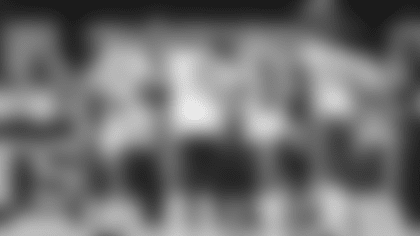Transcript of head coach Eric Mangini's news conference with the New York Jets media before Friday's practice: x
I understand there is going to be a lot of interest and questions related to the ruling yesterday. What I can say is that I respect the commissioner's decision. Anything related to the decision or anything associated to the decision is a league matter. That's all I can say about it. I hope you can respect that.
In terms of what we're doing today, I talked a lot about this being the first normal week we've had. That is a bit of a transition. You had the opening week where there were two extra days. You could get ahead on your film study and your personal opponent study. The time is valuable and you try to use it wisely. In a normal game week, especially for the young guys, they have to get used to transitioning from looking at the tape on Monday of the previous game, getting those corrections, then shift the focus to the next opponent. That's always what we try to do on Monday and that's always what we're focused on.
Tuesday, the players' day off, they take home DVDs, spend time getting ahead of the game plan and getting ahead of the work on the next opponent. When they come in on Wednesday, that's a heavy installation day where you've got the overall scouting report, which is pretty extensive. Then you've got the game plan element. You've got to walk through it, practice it, transition the next day and work on things you did. You add some more installation, third down traditionally. On Friday where it's a lighter day of practice with overall reps, you're working on the red area, short yardage, goal line and those sorts of things.
Each day the focus has to remain consistent. It's a lot of information compacted into a very short amount of time. Guys need to get used to studying what we've put in as well as studying the player they're facing. We often talk about the game within the game. So Darrelle Revis needs to look at the receivers he could be facing and understand the qualities of each guy. It's the same as it will be moving forward, but it is different for these guys than it has been. It's a 4 o'clock game. That's going to be a little bit different. That's all part of the process in the early part of the season.
Baltimore is a team that's extremely innovative on defense. There's always going to be some new wrinkles. They provide a lot of different looks. There's many talented players on the offensive side of the ball. It's going to be new things you have to deal with. There's multiple guys that can hurt you in different ways. You have to understand exactly what we're trying to get done and exactly what they're trying to get done. Special teams — serious problems. I know they've lost [B.J.] Sams. We saw what happened when they switched returners. [Ed Reed is] a pretty good punt returner as well. [And] Yamon Figurs goes in. I saw him a lot in college. He presents some problems. It's working through all those phases and now transitioning to the red area. They've done a very good job there — the lowest scoring defense last year in terms of their opponents.
There is still a lot of work to be done even though it's late in the week. Then it's buttoning everything up, tightening everything up, going through and making sure you're sound and dealing with the loud environment. I think the fact that we've had music throughout training camp and worked with a loud environment for quite some time is a plus, but it's still different than crowd noise. It's something you have to get used to. You try to simulate that as much as possible, but it is something they have to constantly work on.
On whether he put a strong emphasis on special teams this week …
We spent a lot of time on special teams. Mike Westhoff is incredibly insightful. What I like about Mike is his ability to reference back to things that have happened in the past. He's seen most returns and developed a lot of the returns himself. He's been an innovator in the league for many, many years. Often you hear about the West Coast offense or the 46. You never really hear about the innovative ideas that guys bring to the table on special teams. I've worked with some great special teams coaches. Scott O'Brien I worked with in Cleveland — I think he's outstanding. Brad Seely, I think he's one of the best.
To have Mike Westhoff here, be able to compare all those three guys and see the things that Mike brings to the table, is a good situation. I found that very early in the interview process when I was talking to him about joining the team or staying with the team. As a group, I tell the defensive and offensive players, "If you get tired, you're coming out on defense or offense — but not on special teams." Those plays are usually big plays. Those plays relate to field position, where you start or what you have to defend. It's so important to win that battle each week. I think from a preparation standpoint, Mike's one of the best I've seen.
On the importance of video this week because there's an entire regular-season game to study …
During the regular game weeks as opposed to preseason, you look at the tape of the things you did and the mistakes you made, but you also take into account the things you prepared for and the tendencies they had. Were we able to recognize that on third-and-7-plus? We were going to get a 3-by-1 formation and they were going to target the X receiver? Did we have the awareness of a group, not to just play the defense, but play the concept of what the offense is trying to get done? That's such an important part of the process.
The answers to the test are usually right there with the film study and the tendencies. They're going to break, but you have to play the odds and the percentages. You want to see the things you did in practice translate. There's really two levels of evaluation there. Did we do what we were supposed to do? Then, did we anticipate the things that we got? Did we prepare properly for the things we got?
On if he has a response to the fans on the NFL's investigation …
Anything related to this investigation, surrounding it or associated with it is a league-related matter. I respect the commissioner's decision. I appreciate that you need to ask a question associated with the investigation. I hope you respect that I said all I can say about it.
On if he's happy to put that situation behind him and the team and if it was distracting …
Whenever you face a situation, whatever it is, our focus is always focus. You're going to deal with different things throughout the course of the season. It could be an injury, this situation or any situation. The important thing is to focus on the task at hand. That's an ongoing thing that we stress to the players. It's one of the core values that we have. I believe the traits of successful teams and people are to work at the tasks that they're doing, do things the best they can at that time, not worry about the past or the future, and really get that done well.
When you do that and you put those bricks on the pile, eventually you have a very substantial amount of progress. It's not going to change, regardless of what the situation is. It won't change whether we win or lose. It won't change by how much we win by or how much we lose by. It won't change by injury status. The key thing is always collectively to focus on the task at hand, do the best you can do and move forward.
On if the league has instructed him not to talk about the investigation …
Anything that comes up between teams or is related to the teams is handled by the league. We respect the league's decision. We respect the commissioner's decision. That's really where we are.
On if he is happy or feels vindicated with the commissioner's decision ...
I understand the interest in this. I appreciate that. Anything associated with the matter, that's all I can add.
On if taping coaches' signals takes place in college between, say, Wesleyan and Tufts …
At Wesleyan, we were pretty focused there [smiles].
On if they had cameras during that time ...
I think it was a Polaroid that we had [smiles]. Seriously, whether it was Tufts, Bowdoin or Middlebury, all powerhouses in the league, you can't look past any of them. I know that my film study was extensive. There were a lot of really impressive offensive linemen in that league that I was facing — Lomas Brown, Andy Dickerson. What's the difference? It's shades of gray at that point. When you're facing guys like that each week, it's a challenge. I thought Coach Houser always did a great job getting us ready to go. Even before that, when my brother was there, I thought he was well-prepared.
On Thomas Jones feeling more comfortable in the second half vs. New England than in the first half …
There were things in the first half, and it wasn't just one guy. We talked about this Monday, but you can't have 10 guys doing it the right way and one guy on that play slipping up. Then you go to the next run and somebody else does it. With the running game and passing game, if you have one breakdown in one area, it's usually not going to be very good.
By the same token, if you get great support by the receivers, great perimeter run blocking — there was a really good example on Thomas' run in the red zone where Jerricho [Cotchery] came in, sealed the safety, and the run, instead of being a 2- or 3-yard run, turned into a 12-yard run. That's what you need all the time, everybody working in concert together and the receivers not forgetting, "I need to handle this part of the run game so if Thomas does get to the perimeter, he has a chance to get onto the safety or corner," depending on what the run support is.
On if it's important to have consistent starters on the offensive line with a potential QB change …
I believe in the need to have constant flexibility because you can't ever count that the 11 guys that go out and start any given day are going to be the 11 guys that finish the game. If you haven't built in that flexibility and a guy has to go in that hasn't gotten any reps or worked that position, it makes it a lot more difficult. If he hasn't communicated with the other players along the offensive line, it makes it that much more difficult.
Same thing on defense. We work Jon [Vilma], David [Harris], Eric Barton and Brad Kassell in there so the defensive line is hearing the different voices. They know how Kassell is going to fit versus how Jon is going to fit. We did a lot of work on that during the preseason, we do a lot of work on that during the course of the week because you don't know what's going to happen.
On if Clemens will be the starting QB Sunday …
We have today and we're going to look at today. Chad [Pennington] is moving along in his rehab. Each day we evaluate it. We'll look at it today and see his progress. The program has been in place. He is as diligent as ever, whether it's this, studying the playbook or whatever the case may be. We'll see how that goes. I'll make a decision once all the information's in.
On how different teams play the 3-4 defense differently ...
That's something that often gets confused with the 3-4 is that there's only one way to play it because there's three down linemen and four linebackers, it's a standard way to play defense. The nice thing about the 3-4 defense is that you split it down the middle so you have the same number of players on each side of the ball. Regardless of how they shift or motion their players, you can always adjust accordingly because you have two linebackers on the right, two linebackers on the left and the same amount of corners and safeties. So now you can build over, an over front, an under front, you can build a 46 front, you can adjust with the secondary if you want and you can adjust with the linebackers if you want.
Each team approaches their 3-4 differently. With Rex [Ryan]'s approach, he had Mike Nolan there. Mike had been here working with Al [Groh], part of that defensive sort of philosophy, the same philosophy, and you see elements of that. Then you see elements where he builds a 3-4 and there's influences from the things his dad did. There's influences from the things Marvin [Lewis] did while he was there. You just create your approach with that configuration of defensive players. Every single 3-4 team is different.
On how Dom Capers' 3-4 compares to the version used by Baltimore and New England …
That's a different approach as well. From a different philosophy, they were early on developing the zone blitz concepts. I forget what year it was. I want to say early Nineties. There's elements of that and he's branched off and the people he's worked with have branched off. There's that part of it. There's influences from when Nick Saban was there. Each time you incorporate somebody new, the playbook evolves and grows. You keep the things you like, throw out the things you don't, and create your unique package for your players and your team.
On if he has gotten any phonecalls of support this week …
I've said all I can say with anything surrounding this case.












